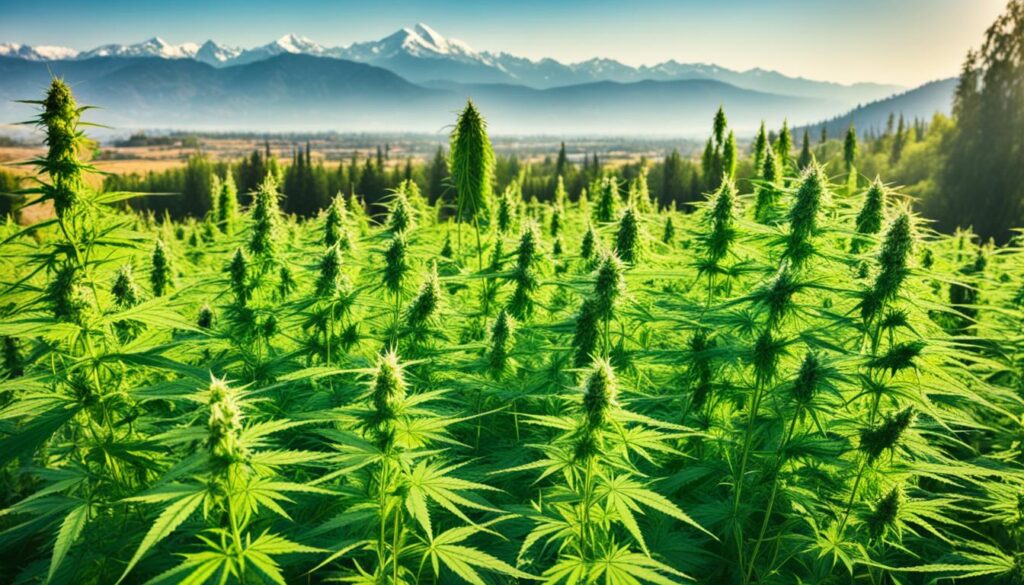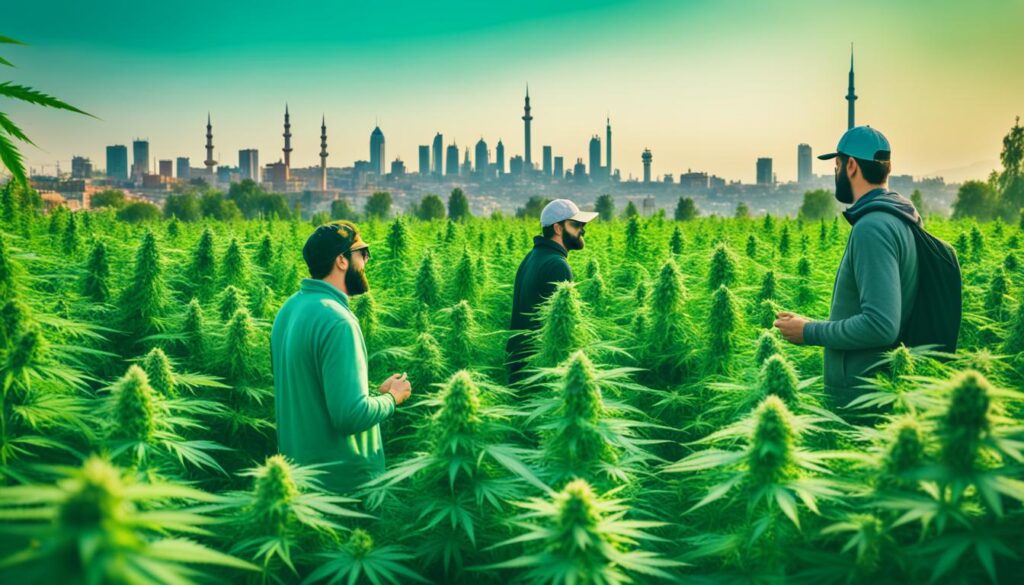Welcome to Gujranwala, the heart of Pakistan’s cannabis world. Here, you’ll learn about cannabis in Gujranwala. We’ll cover its availability, how it’s grown, and what people think about marijuana in Pakistan. You’ll see how this city is a key place for cannabis cultivation Gujranwala, hashish production Gujranwala, and weed availability Gujranwala.
Key Takeaways
- Discover the thriving cannabis scene in Gujranwala, Pakistan
- Explore the availability and cultivation of marijuana in the region
- Understand the local attitudes and legal aspects surrounding cannabis in Gujranwala
- Learn about the illegal drug trade and hashish production in Gujranwala
- Gain insights into law enforcement and substance abuse prevention programs
Understanding Weed in Gujranwala
Gujranwala is in Pakistan’s Punjab province. It’s known for its cannabis and marijuana farming. The area’s climate and soil are perfect for growing cannabis. This has made it a big part of the local culture.
Cannabis Cultivation in Gujranwala
Gujranwala is a key place for growing cannabis. Many farmers there grow marijuana. The land is fertile and the weather is just right for growing top-quality cannabis.
These farmers have learned from their families for years. They share their skills to make sure they get a good harvest.
Marijuana Farming in Pakistan
Pakistan has a long history of growing marijuana. The charas (hashish) from here is very strong. Growing marijuana is big in places like Gujranwala.
Even though it’s illegal, people still grow and sell cannabis. This is because it’s a big business.
“The cannabis industry in Gujranwala has deep roots, with farmers leveraging the region’s favorable climate and soil to cultivate some of the finest marijuana in the country.”
Despite the legal issues, Gujranwala and other parts of Pakistan keep growing cannabis. This supports a big illegal drug trade. This trade affects the region and goes beyond.
The Illegal Drug Trade in Gujranwala
Gujranwala is a city in Pakistan facing the illegal drug trade. This trade includes marijuana and its products, like hashish. These items are mostly sold on the black market. Smugglers move charas and other banned items across Pakistan and into other countries.
Black Market Cannabis in Gujranwala
The drug trade in Gujranwala is complex. About 6 percent of Pakistan’s people used drugs not including alcohol and tobacco last year. This includes 9 percent of men and 2.9 percent of women among the 6.7 million users.
Worldwide, 284 million people used drugs in 2020. Cannabis was the top drug used. This demand has made a big black market for cannabis in Gujranwala.
Charas Smuggling Routes in Pakistan
Gujranwala is a key spot for smuggling charas and other cannabis products. The World Drug Report 2022 found 11.2 million people injected drugs, with many having health issues. These illegal paths move charas and cannabis from production spots to different places in Pakistan and beyond.
| Charas Smuggling Routes in Pakistan | Percentage of Global Cannabis Resin Seizures |
|---|---|
| Afghanistan, India, Lebanon, Morocco, Pakistan |
|
The U.S. government has given over $1 billion USD in 40 years to help Pakistan fight crime and improve police work. But, the illegal drug trade in Gujranwala keeps growing. This is a big problem for the authorities and the people.
In Gujranwala, having, selling, or using cannabis is against the law. If caught, you could face jail, fines, or other legal trouble. It’s important to get legal help if you’re charged with cannabis crimes in Gujranwala.
Weed in Gujranwala: A Closer Look
In Gujranwala, the weed scene is complex. It includes many types of cannabis products and social factors. The area is known for its weed farming and black market trade.
A study found many farmers in Gujranwala grow cannabis. It looked at 356 farmers. They mostly get weed info from friends and local experts, not from phones.
Weeds hurt crops a lot in Gujranwala. If not controlled early, they can cut yields by 40-50%. This is true for many crops like rice and corn. Farmers use many ways to fight weeds, including chemicals, which can harm the environment.
| Crop | Yield Reduction due to Weeds |
|---|---|
| Wheat | 20-40% |
| Rice | 20-63% |
| Cotton | 20-55% |
| Potatoes | 10-18% |
| Corn | Up to 45% |
Gujranwala farms grow many crops, like rice and potatoes. These crops face many weed types. Research found 67 weed species in some fields and 95 in another area.
But Gujranwala also has a big problem with illegal weed. The black market for cannabis and charas is big here. This illegal trade makes getting weed in Gujranwala harder and more dangerous.
The weed issue in Gujranwala is complex. It deals with weed in farms and illegal weed trade. Understanding cannabis in Gujranwala and marijuana in Pakistan is key to solving these problems.
Legal Aspects of Cannabis in Punjab
In Pakistan, growing and trading marijuana is mostly illegal. But, the rules on cannabis products like hemp change in different places. In Punjab, where Gujranwala is, talking about hemp cultivation is a big topic.
Hemp Cultivation Legality in Punjab
The laws on cannabis in Punjab are tricky. You can’t make or sell fun marijuana. But, growing industrial hemp might be okay.
Some people want to make hemp legal in Punjab. They think it could help the economy by making things like clothes, building stuff, and personal care products.
But, it’s not clear if hemp growing is legal in Punjab. The drug laws can be confusing. If you want to grow hemp, you need to know the rules well.
The talk about hemp cultivation in Punjab is still going on. It’s important for people and companies to keep up with the law changes. They should talk to local officials and lawyers to know what’s allowed and what’s not.

“The legal status of cannabis in Punjab is a complex and evolving issue, with ongoing discussions and policy proposals aimed at exploring the potential of industrial hemp cultivation in the region.”
Law Enforcement and Cannabis
Anti-Narcotics Operations in Gujranwala
In Gujranwala, the government and police are fighting hard against the illegal cannabis trade. They focus on stopping the black market for marijuana. This is a big goal for them.
They want to break up the groups that sell cannabis illegally. They do this by watching closely, doing raids, and taking away illegal drugs. This helps to make cannabis and other drugs less available.
But, some people question how well these efforts work. Even after big drug busts, the drug trade keeps going. This shows the hard problems that police face.
Still, the police in Gujranwala are not giving up. They keep watching closely and working together with other groups. This helps fight the illegal cannabis trade and its crime.
| Incident | Location | Outcome |
|---|---|---|
| Heroine Swallower Convicted | Gujranwala | A 27-year-old man was jailed for three months for destroying a quantity of heroin during a struggle with narcotics officers. |
| Cannabis Offense Figures in Wellington Up Sharply | Wellington | Figures show a notable increase in cannabis-related offenses in Wellington. |
| Auckland Harbor Cargo Checks for Drugs Tightened | Auckland Harbor | Measures to tighten drug checks on cargo at Auckland Harbor were implemented. |
The anti-narcotics operations in Gujranwala show the government’s strong will to tackle the cannabis problem. It’s a tough fight, but they are ready to keep going. They want to make the area safer and healthier.
Substance Abuse Prevention Programs
In Gujranwala and Pakistan, many substance abuse prevention programs are working. They teach people, offer help, and push for better choices instead of drugs.
The Drug Demand Reduction Conference is held every year. It’s in Nairobi and talks about stopping drug use. Experts and groups share ideas on how to help people.
Over 80,000 people got help from these programs. More than 500,000 learned about stopping drug use through mobile units.
The Mian Afzal Trust Hospital in Gujranwala trains people to fight drug use. They teach over 300 people to help in their communities.
This hospital has a 10-week rehab program. It includes tests, treatment, counseling, and training. The goal is to help people beat addiction and live better lives.
“Thinking Globally, Acting Locally” – the theme of the 2018 Drug Demand Reduction Conference, encapsulates the essence of these substance abuse prevention programs. By combining global expertise and local implementation, they strive to create lasting change and improve the lives of those affected by substance abuse.
In Pakistan, about 6.7 million people used drugs last year. Programs are key to fighting this issue. They help the government and groups work towards a healthier community.

Health Benefits and Risks of Cannabis
Many people don’t like the idea of using cannabis for fun. But, it could be good for health. It might help with pain, seizures, and mental health.
Potential Medical Uses of Cannabis
Research says cannabis could be good for many things:
- Pain relief: It might help with chronic pain.
- Seizure reduction: Some parts of cannabis could make seizures less frequent.
- Anxiety and depression management: It might help with these mental health issues.
- Stimulation of appetite: It can make people eat more, which is good for some people.
- Improved sleep: It could make sleep better, which is good for health.
Concerns and Precautions
But, there are risks to think about too:
- Respiratory issues: Smoking it can hurt the lungs.
- Addiction and dependence: It can be addictive.
- Cognitive impairment: It can make thinking harder.
- Potential interactions with medications: It might change how other drugs work.
- Legality and regulation: Laws about it are still changing.
When thinking about using cannabis for health, weigh the good and the bad. Always talk to a doctor first.
“25 years of research on medicinal plants in Latin America has revealed the potential of cannabis to offer relief for a variety of health conditions.”
Conclusion
We’ve looked into weed in Gujranwala and cannabis in Pakistan a lot. We talked about how it’s grown and traded, and the laws around it. This deep dive has given you a clear view of this tricky topic.
The debate on making cannabis legal is still going on. It’s important for everyone to know about it and talk about it wisely. The facts we shared show how weed affects farming, health, and the cannabis industry in Gujranwala and Pakistan.
We need to keep a balanced view on weed in Gujranwala and cannabis in Pakistan. By keeping up with new info and talking things through, we can help shape its future. This way, we make sure everyone’s views are heard.

As a veteran weed smoker for over 30 years and been very clean for the last 3 years, I have been craving it.
One thing I’ve never done is consume it?
I came across SunJet Plug and thought mmmm how esp with legalities etc.
So I made the plunge and purchased 12 brownies, well within 30 mins it kicked in and it was immense as I had a whole one from the off 😜
The rest did not last a week I was having 2 a day and my wife lost me for a few days I was in my own world apparently.
Kudos to the Sunjet plug love em, the taste is a bit undesirable could do with a tweak or two other than that no complaints
Contact him on his telegram link: t.me/sunjetplug
His email : sunjetplug@gmail.com
Many many thanks.😁
Take note ,he does not have telegram channels
Sunjet plug is 100% legit.. I’m a repeat customer.. I’ve ordered 10+ times now, and I’ve never had an issue.. Great product, great service.
Sunjet plug is extremely trust worthy , they never fail in what ever product I order, and its always in my hands with an hour of ordering 99% of the time….. its honestly rare when its more than 2 hours and that’s only because its the weekend when ive orded or a national holiday is on or something lol …. brilliant service I’m probably pushing maybe 2 months with them and I’ve never been disappointed ❤️ my only recommendation would maybe do a stamp card to get something free after 5 orders or a loyalty bonus of some kind ❤️
Email sunjet.. sunjetplug@gmail.com